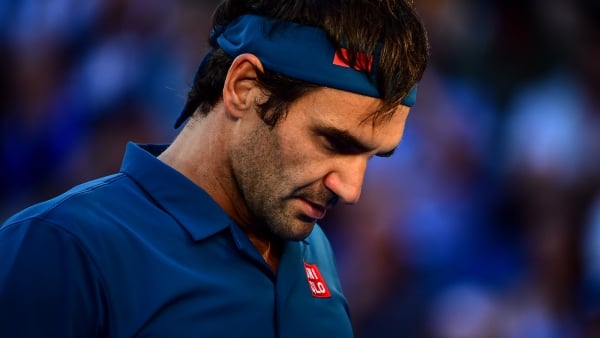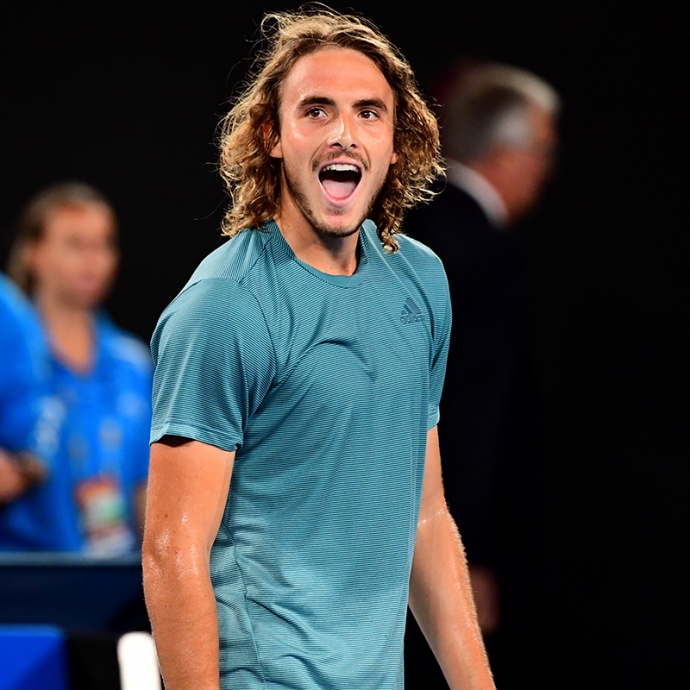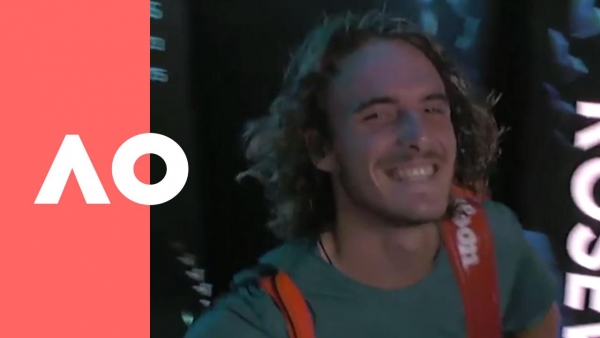Stefanos Tsitsipas produced the biggest win of his career to oust defending Australian Open champion Roger Federer to reach the quarterfinals for the first time, the youngest player left in the men’s draw downing the oldest 6-7(11) 7-6(3) 7-5 7-6(5).
The 20-year-old No.14 seed edged a tense, at times tetchy affair against the 20-time Grand Slam champion on Sunday night, and will face Roberto Bautista Agut for a place in the semifinals after the Spaniard knocked out last year’s other finalist, Marin Cilic.
“I’m the happiest man on earth right now,” said Tsitsipas, who ended Federer’s bid for a hat-trick of titles and a record seventh men’s singles crown at Melbourne Park.
MORE: 'Massive regrets' - Roger rues end of reign
“Roger is a legend of our sport, so much respect for him. He showed such good tennis over the years. I’ve been idolising him since the age of six, and it was a dream come true for me just being on Rod Laver Arena facing him. Winning at the end, I cannot describe it.”

While Federer enjoyed the lion’s share of support within Rod Laver Arena, Tsitsipas’s fans have been among the most vocal during his run to the fourth round. Those that could not get a ticket in the stands made their presence felt in nearby Garden Square, where Greek cheers and chants echoed around Melbourne Park.
He gave them plenty to cheer about. Tsitsipas was anything but overawed by Federer, having faced the 37-year-old at the Hopman Cup. In Perth, the Swiss had joked it was like “beating my son” after edging a 7-6(5) 7-6(4) victory against the Greek in the semifinals. But this was serious business from the outset.
The tension was palpable as early as the first game, when Tsitsipas was docked a serve after two time violations while fending off a pair of break points. Federer didn’t agree with umpire James Keothavong’s decision in the same game to award the No.14 seed a point after a challenge, setting the tone for the contest – between the points at least. When the ball was live, the action was electric, both players playing with great variety behind some fine clutch serving in the opener.
Neither player had seen a break point after the first game, so it was little surprise to see neither give an inch in the tiebreak. Tsitsipas recovered a minibreak at 4-5, poking home a volley while diving out of the way of a backhand drilled right at him. Both players stood firm on serve through three set points apiece, but on Federer’s fourth Tsitsipas blinked, skewing a forehand wide after another heart-stopping rally.
The scoreboard may suggest the second set followed suit, but Tsitsipas found himself forced to weather an onslaught on serve. While Federer rattled through his first four games in an average south of 90 seconds, the Greek was left clinging on at 2-3 and 3-4, saving four break points along the way.
Four more followed at 4-5, each of them primed to put Federer into a two-set lead, but again Tsitsipas survived to reach a tiebreak, where his resilience was rewarded after firing a forehand winner on his first set point.

As if to underline the knife-edge both players were dancing along, each saved break points from 15-40 down at the midpoint of the third – Tsitsipas missing out on his first two chances to break, Federer his 11th and 12th. The Swiss’s forehand had been wayward when it mattered on most of his dozen chances to break – the stroke accounted for 33 of his 55 unforced errors – and cost him most dearly when the Greek again reached 15-40 at 5-6, hooking it low into the net to give up the set.
As the match entered its fourth hour, fatigue became a factor for both players, with Federer a half-step slower to the short ball and Tsitsipas’s thighs requiring a rub-down at 3-4. But both clung on to their service games to reach a third tiebreak, which swung in favour of both players before Federer fired a backhand just long – his 55th unforced error – to give up match point, a late call and the Swiss’s challenge simply adding to the drama.
There would be no comeback this time. Tsitsipas hammered a cross-court drive that Federer could only punch into the net, Melbourne Park erupting like never before as the clock hit three hours, 45 minutes.
“This match point is going to stay, I'm pretty much sure, forever, for the rest of my life,” Tsitsipas said. “I just managed to close that match and stay strong, beat my idol. My idol today became my rival.”
The echoes of Federer’s four-set fourth-round victory over his own idol, Pete Sampras, at Wimbledon in 2001 resonated around Rod Laver Arena. “You’re watching the changing of the guard,” John McEnroe announced in the immediate aftermath, much as many did those near-18 years ago.
“That's crazy, what a coincidence,” Tsitsipas said with an air of wonder as he considered the parallels. “I watched that match when I was playing Wimbledon.
“I did watch couple of [Federer’s] matches in the past that he played on hard courts,” he added. “I watched a few highlights of him that I used to do the analysing, some highlights of players that beat him in Grand Slams.”
Asked what were the keys to the momentous victory, Tsitsipas said: “It’s very important to have this aggressive mindset and not to think too much about what’s going to happen,” said the Greek. “Stay in the moment, play percentage tennis, have first serves in and press from the very beginning.
“I managed to do that. I didn’t lose my patience in some of the rallies that we played, so that was the key to saving those break points. And overall, I showed a great fighting spirit and determination.
“I do believe that coming to the net, being aggressive and taking the ball early, we have to keep it going. Most players in this era are baseliners, and I really like this aggressive game – coming to the net, serve-volleying sometimes. It keeps the game alive.”


